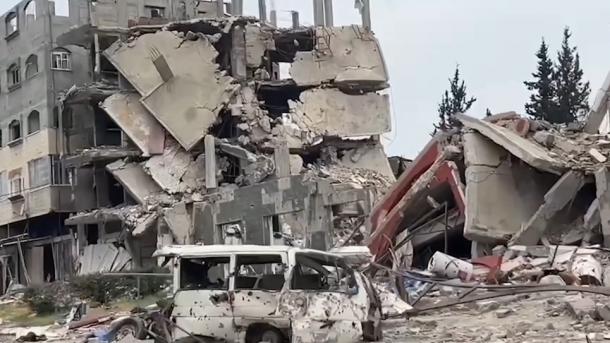Gaza's Decades-long Road to Reconstruction
As the conflict in Gaza enters its seventh month, United Nations reports paint a stark picture of the devastation. With an estimated cost exceeding $40 billion, reconstruction efforts could take decades, displacing millions into poverty.
Published May 04, 2024 - 00:05am

Image recovered from trt.net.tr
Reconstruction efforts in Gaza face unprecedented challenges as the region reels from continued conflict, with the United Nations estimating costs upwards of $40 billion and a timeline extending into decades. The recent assessments call attention to the dire humanitarian and development crises unfolding in the region.
The United Nations Development Programme (UNDP) warns that the poverty rate within the Occupied Palestinian Territories has surged as the Israeli offensive approaches its seventh month. Over 1.74 million Palestinians are at risk of falling below the poverty line, igniting concerns over a long-term development crisis that endangers future generations.
With both human development and economic indicators plummeting - poverty rates potentially rising to over 60% and GDP losses nearing $7.1 billion - the ramifications stretch beyond immediate reconstruction to a broader crisis capable of hampering post-war recovery and development.
The magnitude of destruction has left around 37 million tons of rubble, including unexploded ordnances and hazardous materials like asbestos. The debris complicates the situation, as it poses additional challenges for safe and efficient removal, which is crucial for rebuilding efforts.
According to UN officials, the current rate of devastation is without precedent since World War II, highlighting the enormity of the task at hand. Gaza's residential infrastructure has been particularly affected, with 72% of homes either completely or partially destroyed. As a result, there has been a significant internal displacement within the territory, exacerbating the humanitarian crisis.
International pledges of financial support for the reconstruction project have been reported, with Arab countries showing signs of solidarity and commitment. However, questions loom regarding the overarching governance structure that will emerge post-conflict and direct the reconstruction process. The UN stresses the need for rapid action to ensure timely rehousing and the restoration of normal life facets, such as economy, health, and education.
Experts also underscore that the situation presents a profound social cost affecting future generations. The conflict has led to a regression in life expectancy within the Palestinian territories and has undone years of development efforts. UN agencies, including the UN Mine Action Service (UNMAS), have highlighted the urgency of the task ahead and the immense financial requirements needed to push through in the following years.
In light of these challenges, numerous international actors and agencies are mobilizing to coordinate the herculean task of rebuilding. The European Union has expressed its readiness to contribute to the reconstruction and recovery efforts, with a keen focus on sustainable development and political stability. Multi-lateral aid is seen as essential, ensuring the delivery of emergency services amidst the recovery process while setting the foundation for a more resilient future.
On the ground, NGOs and local organizations are also undertaking vital roles, addressing the immediate needs of affected populations, particularly those who have been made homeless. Humanitarian aid is not only about providing shelters but also about ensuring access to food, clean water, and medical care, which remain top priorities. In addition, psychological support is becoming increasingly recognized as critical, given the profound trauma experienced by countless individuals, especially children.
There is an imminent need for international oversight to prevent further decay into violence and chaos. Dialogue is essential, with many advocating for renewed peace talks that could lead to lasting solutions. Simultaneously, attention has turned to the role of economic aid and how it is administered, emphasizing transparency and accountability to avoid mismanagement or diversion of funds.
Amidst these reconstruction efforts, the environment has emerged as another victim of the conflict. The rubble from damaged buildings, the potential for water contamination from damaged infrastructure, and the degradation of agricultural land pose serious environmental concerns. Specialists in environmental rehabilitation are needed to address these issues, integrate sustainable practices into the reconstruction, and ensure the wellbeing of the region’s ecosystem.
As the international community contemplates the road to recovery, the extensive scale of the ceasefire's aftermath reveals the need for a comprehensive approach to peacebuilding. This approach should encompass not just physical reconstruction, but also socio-economic rebuilding and political reform. It requires a concerted effort from local authorities, international organizations, and the civil society to pave the way towards a stable and prosperous Gaza.
Undoubtedly, the path ahead is fraught with complexity and will need unwavering commitment from all stakeholders involved. The global community watches on, hopeful but cautious, as Gaza embarks on this long journey towards healing and rebuilding, with the perseverance of its people at the core of this resurgence.







